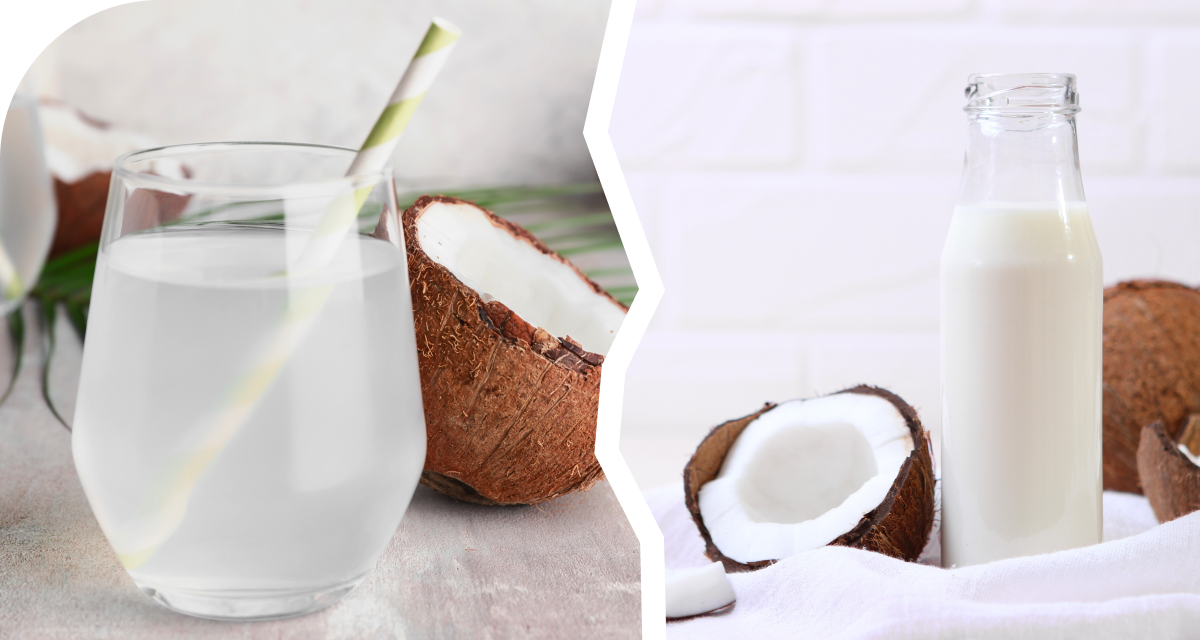Coconut Juice vs Coconut Milk: What’s the Difference?
Coconut beverages are refreshing, flavorful and fun – but what’s the difference between coconut juice vs. coconut milk? While both ingredients are popular in kitchens, cafés and health stores across the United States, it’s important to understand how each of these products is made, used and incorporated into today’s larger food and beverage trends.
What is Coconut Juice?

Coconut juice, often referred to as “coconut water,” is the clear liquid you find inside young, green coconuts. Coconut juice boasts a slightly sweet flavor but is low in calories and chock-full of electrolytes like potassium, sodium and magnesium. This unique nutritional composition makes coconut juice a popular beverage option for health-focused consumers looking to maximize their hydration and meet their wellness goals, with Tastewise data suggesting coconut juice lovers actively search for products that are branded as “fresh,” “healthy” and “refreshing.”
What is Coconut Milk?
Unlike coconut juice that is found free-flowing inside of coconuts, coconut milk is made by grating the white flesh of mature coconuts, blending it with water and straining it into a creamy liquid. Coconut milk is rich, thick and high in fat content, making it a staple in curries, soups, baked goods, lattes and even cocktails. Coconut milk can be frothed up, cooked down or mixed into a variety of foods and beverages as a flavor and texture-enhancing agent.
What’s the difference between Coconut Juice and Coconut Milk?
Although they come from the same fruit, coconut water and coconut milk are nutritionally and functionally distinct in a few key ways:
Calories & Carbs
Coconut juice is recognized as a low-calorie beverage option, with most servings coming in at roughly 40–60 calories per cup. Coconut juice is also low in fat and unsweetened varieties are low in sugar and free of artificial sweeteners, making it a major player in health-focused current food trends. Conversely, coconut milk is higher in fat and relatively calorie-dense, delivering 200–450 calories per cup depending on thickness.
Taste
Coconut juice is known for its light and refreshing flavor, with many consumers reporting a sweet, nutty and tropical taste. Coconut milk, on the other hand, boasts a rich and slightly sweet flavor profile, making it the perfect addition to soups, sauces and sweet indulgences.
Texture
The light and watery texture of coconut juice makes it an ideal beverage for casual sipping on a hot day. While coconut juice can sometimes appear in cocktails, mocktails and smoothies, it’s more often used as a hydration multiplier for on-the-go health buffs. Coconut milk, however, is known for its rich and creamy texture, making it a popular addition to a variety of sweet and savory dishes and drinks. Coconut milk also froths and foams well, making it a versatile dairy-free alternative for coffee connoisseurs.
Production
The production of coconut water is fairly straightforward: The water is extracted from young coconuts and minimally processed to enhance the quality. Coconut milk production is more involved, however, as the white flesh from mature coconuts must be removed and blended with water to create a thick and frothy liquid.
Here’s a simple comparison table based on your content:
| Feature | Coconut Juice (Coconut Water) | Coconut Milk |
|---|---|---|
| Source | Clear liquid from young, green coconuts | Made by blending grated mature coconut flesh with water |
| Calories | ~40–60 calories per cup; low fat and sugar | ~200–450 calories per cup; high in fat |
| Texture | Light, watery; ideal for hydration | Rich, creamy; thick and frothy |
| Flavor | Light, sweet, nutty, tropical | Rich, slightly sweet; enhances dishes and drinks |
| Nutritional Value | High electrolytes (potassium, sodium, magnesium); low carbs | Rich in healthy fats; some electrolytes |
| Uses | Sports drinks, smoothies, hydration multipliers | Curries, soups, baking, lattes, cocktails |
| Processing | Simple extraction from coconuts | Grated flesh blended and strained; more processing required |
| Market Appeal | Popular with health-conscious, active consumers | Popular as dairy-free milk alternative and for indulgent recipes |
Must-know coconut beverage trends
Coconut juice and coconut milk fill specific niches in today’s trend-focused food and beverage market. In the context of overarching milk trends, for example, coconut milk has long been embraced not only for its flavor but for its versatility as a dairy-free milk alternative for consumers with specific dietary preferences. The meteoric rise of coconut milk as a plant-based milk alternative (PBMA) also complements recent coconut macaroon trends and other viral desserts that seek to blend global flavors with rich and creamy textures.
Coconut juice occupies space on the opposite side of the food and beverage market, as its low calorie count and high electrolyte content appeal to health and fitness-minded consumers of all ages. Coconut juice also aligns with water trends and juice trends that emphasize clean-label, functional beverages that fit into active lifestyles. In recent years, coconut juice has emerged as a healthier, low-sugar alternative to popular sports drinks and given way to a whole new market for electrolyte beverages and hydration multipliers.
Sales and consumption: What the data says
Because coconut juice and coconut milk serve distinct purposes within the broader food and beverage market, it’s important to understand the specific sales and consumption data related to these different products. Here are a few data points to remember when looking at coconut beverage trends:
- The global coconut juice market was worth roughly $4.43 billion in 2024.
- The global coconut milk market was valued at $2.69 billion in 2023
- 1 in 3 U.S. households regularly purchases plant-based milk alternatives like coconut milk.
- Tastewise data indicates a 7.13% YoY increase in social media discussions about coconut juice.
- In a recent survey, 86% of consumers reported they drink hydration beverages in the morning to help them fuel their day.
All of these facts highlight the steady demand for both coconut juice and coconut milk products. Brands looking to leverage these coconut trends into widespread success with the right combination of innovation and insight. As coffee trends, health food trends and globally-inspired dishes continue to make waves on the international scale, coconut-based products are well-positioned to meet a very specific moment in the food and beverage industry.
Who’s buying? The popularity and target audience of coconut beverages
Comparing coconut juice to coconut milk is a little bit like comparing apples and oranges, as both products are intended for their own distinct use cases. Generally speaking, however, coconut juice is more popular among athletes, wellness-minded consumers and those seeking a natural alternative to popular hydration multipliers.
On the flip side, coconut milk is a hit with home cooks, foodies and consumers looking for plant-based milk alternatives for daily use. Coconut milk, while higher in fat and calories, is still a solid, health-focused alternative to traditional dairy milks that can be incorporated into a variety of dishes and drinks.
With both coconut milk and coconut juice appearing more frequently in social media discussions, it’s clear that coconut-based products are resonating with consumers of diverse tastes, backgrounds and preferences.
What’s better: Coconut milk or coconut water?
The short answer? It’s up to you!
Coconut milk and coconut water each have their place in the modern consumer’s kitchen. If you’re looking for a natural hydration boost, coconut juice is the way to go. If you’re in need of a rich and frothy milk alternative for your morning cappuccino, look no further than a healthy pour of coconut milk. Both coconut beverages have their strengths, and using them in the right contexts can offer consumers memorable flavor experiences with a variety of wellness benefits.
Final thoughts
If nothing else, the coconut juice vs. coconut milk conversation highlights the incredible versatility of coconuts and their derivatives. While coconut juice shines as a functional, hydrating beverage option, coconut milk offers richness and indulgence in a variety of culinary contexts. The consistent popularity of these products underscores the changing needs and priorities of today’s food and beverage consumers and shines a spotlight on some of the health and wellness-focused food trends we can expect to see in the months and years ahead.
FAQs
FAQs about coconut milk vs coconut juice
Coconut water is considered the healthier option, as coconut juice alone is relatively low in carbs, calories and sugar. Coconut milk – while rich in many nutrients – is high in fat and often includes added sugars and artificial sweeteners.
You could, but it probably wouldn’t yield great results! The texture, composition and flavor of coconut water differs significantly from coconut milk and would not be well-suited for most coconut-milk-based dishes and drinks.
Coconut water is the clear winner when it comes to selecting an electrolyte-rich beverage. Coconut juice (water) contains a variety of electrolytes like potassium, sodium and magnesium that can help consumers boost hydration levels without relying on sugary hydration multipliers or sports drinks.
No. While coconut milk contains some electrolytes, the overall amount doesn’t even come close to the high electrolyte content in coconut water.




